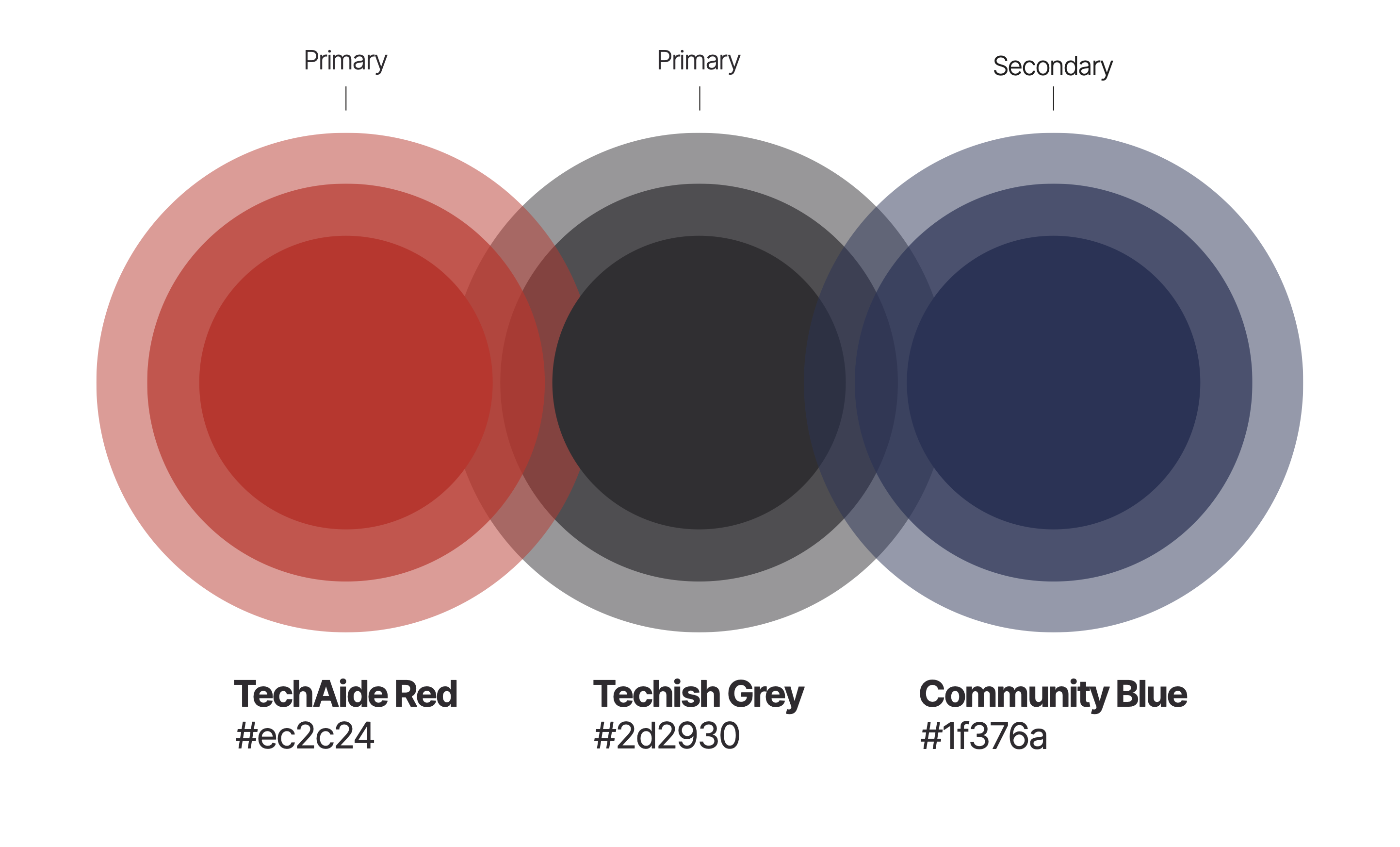Interview
Unveiling Techaide’s new identity with MingXi Gu
MingXi Gu, a second year International Baccalaureate Pure and Applied Sciences student at Collège Jean-de-Brébeuf, takes us through his exciting vision for the future of the Internet, and the role Techaide plays in democratizing the tech community in Montreal and beyond.
After months of channelling their web design skills and creativity into “a cause that simply makes sense in the world today”, the group of volunteers reflect on the mentorship and collaborative opportunities they found here at Techaide. To learn more about ways you can volunteer and contribute to your community with your unique skills in a nonconventional way, visit our (newly redesigned) website!
What pushed you as CEGEP students to get involved with Techaide?
I have to say, for the website, that’s mostly Philip-Olivier Jean, Jean Mourad, Alexis Boudrias and Nicolas Dostie and it’s really thanks to them that this came together! So I was introduced to Techaide by Shibl Mourad, who has been part of Techaide for quite a while and he had an idea for Techaide Café.
Jean and I had the pleasure to help him organize some Python classes for other students my age. When we look at Techaide, at least for my entourage, it’s the gathering place for an important community with lots of power to create change, and plus a lot of people see it as this hub of open-minded innovation and creativity. And what Techaide has is a very socially conscious position of using this innovative way of thinking, but also the wealth that comes with it to benefit the other spheres that wouldn’t prosper as much as tech. This just made sense to help with that distribution of knowledge and resources. It’s not like I have a valid reason to say no to this! I organized a hackathon before, so this Python course came just at the right time.
I was always interested in graphic design, so I pitched myself and said “What if Techaide had a rebranding?”. I met Laurent Maisonnave and Alan MacIntosh and they were very interested, so we made this relationship work and I brought forth some amazing friends to be part of this. For a non-profit, it’s good to have a lot of people engaging with its activities and it’s simply fun. It’s a great opportunity for us to meet some cool people and do some volunteering work outside of the scholastic context. That link between the tech community and the social benefits it could bring, that’s an end in itself and it really made sense to us. It’s hard to find opportunities as unique as this.
In school, we’re often encouraged to do volunteering activities, but they’re all kind of the same thing: tutoring, food banks… But Techaide is a very flexible thing and you can contribute in ways that match your interest. You can’t say that web design is stereotypically a volunteering activity, but with this relationship with Techaide, it becomes a great way to contribute.

From left to right: Jean Mourad, Alexis Boudrias, Philip-Olivier Jean, Ming Xi Gu
And how was working with Techaide compared to the work you do in a school context?
Well, in my opinion, school projects are rather restrained in the way that the audience is planted (the teacher) and there is a narrow path to do interesting work. In the outside world or some extracurriculars, you have to seek out and understand the audience yourself.
Extracurriculars and outside projects also allow mentor-mentee relationships. It pushes you to learn yourself while receiving practical knowledge and insights. Mentorship is incredibly helpful and rewarding. The mentor can guide and push you to learn from the inside out. That difference in the inherent dynamic is what I found the most different and enriching with the school.
Did you encounter any challenges while working with Techaide? And what kind of resources did you find useful throughout the process?
We had some great first batches of ideas, and then we received some valuable feedback… But then we weren’t sure what the good version with the feedback would look like. We tried different iterations to see what actually worked… I guess how we overcame that challenge was to stop thinking too hard about it! We started focusing on what they had in front of us. We said, “let’s take a step back, we don’t have to reinvent the wheel”. That is also an exercise to reduce the friction of communication between us and get the communication barriers down, without overthinking what’s a good idea and what’s a bad idea.
When you aren’t inventing radically new things, most of it or some version of it already exists. So we thought “let’s let loose, see what has and hasn’t worked, and get something that has our own touch and works well for Techaide”. We definitely learned a lot from others who have done it and done it best.
What’s the best lesson you took from your involvement with Techaide?
That cooperative magic of teamwork is very real. This project was multi-faceted: there was branding, there was communication, the website, copywriting for the website, and many elements. Finding the right team and the people you work with is by far the most important aspect, perhaps more important than what the project might even be. With the right team from the start, you feel like anything can happen.
Even outside of Techaide, I realized that a lot of projects go downhill because the team isn’t right and it just doesn’t work out. And it’s not only about getting the best people at what they do. Even for small projects, cultural fit is equally important because if you trust the people and have faith in the process, you remove so many insecurities about the project.
A lot of decisions about choosing people are intuitive through subtle, personal details from my experience. Good people push you further than you can push yourself, and help you see your blindspots. Sometimes, it comes with cultivating the right intuition! After working with Techaide, I try to apply that in every single project that I do, and so far it has worked quite well.
What kind of impact do you think Techaide has on the tech community in Montreal and beyond?
I think Techaide is leading by example and is creating increasing awareness that you can’t only be focused on the tech, the products, the revenues… You have to invest in the local community, however, that may be, through funds or resources or knowledge sharing.
The tech community of the future is being shaped by these initiatives that plant seeds in people, such as Techaide did for me. From my point of view as a student, when you plant these seeds early on and invest just a little bit, even just by trusting young people to redesign a website and giving them the resources to do that, this shapes their thinking at an early stage. Not only does this help them develop an interest in, in this case, technology and the technology community, but you also foster this culture of giving back. And that’s the core of Techaide. Generosity and social consciousness are passed on from one to another. This is creating the circular exchange that comes around every generation… After all, going slightly out of your way to investing in people will almost certainly have positive returns.
Right now, Techaide is in the early stages of the potential it could have! And the continuation of that potential depends on the next generation of technologists (of all ages) and everyone who interacts with technology.
As a student, how do you see the local tech community evolve in the next 5-10 years?
I definitely love and am very invested in technology. And we know that it is the future. Not everything will be about technology but a lot of it will depend on it, and it shapes everything we do… At least in our local tech industry, I wish there was more interaction with young people! From my experience, the tech industry is there and is very focused on what it’s doing. But I don’t see it as being particularly outward-looking to people that aren’t directly involved with tech…
Occasionally we get interactions on college campuses, and It’s exciting for young people to be exposed to the works of great technology companies… But it happens every so often. Most of the exposure comes from the internet and other media. Because of this lack of direct exposure to high technology in schools, I find that students aren’t as into technology as they should be! Some, including me, realize it slightly later than preferred. I guess we can always say we wish we could have gotten into it earlier.
I hope the local tech industry in Montreal, with all its exciting undertakings, would take this little step outside of their model and operations and take their generosity to pique young people’s curiosity a bit more often.
What kind of future do you see for the Internet?
I’ve had a lot of ideas about this recently… One future I imagine is to think of the Internet as a city because it is a city. It has institutions, rules, schools, commerce, and entertainment, collective behaviour, art, cultures, crime, and just about everything else you can think of. If you think about 2D representations of code as 3D buildings like the simulated worlds of video games, then the Internet is one of the biggest cities out there. It’s exponentially bigger than New York, and it’s a really great place to be other than raising your family. If we think of it as this 3D city, then the Internet is one where we could do so many things we couldn’t do in the real world and there’s a lot of fascinating possibilities with that. Going on a walk with a family member overseas, exploring a new universe with friends, and surely some terrible things too like all powerful technologies.
This is among many other ways of looking at the future of connectivity. With the advent of virtual and mixed reality, better computing and computer graphics (Unreal Engine 5 is fascinating), 3D modelling, ultra-fast networks, deep learning and blockchain, working towards changing the way we perceive and interact with the web, and basically reality at that point, and exploring what really makes us human are quite interesting to learn about. And that last part is absolutely a euphemism. As you can see, I’m very excited about the future.
What do you wish to tell other students about technology?
What I think is counter-productive is that many people see terms like “tech” or “technology” and immediately, intuitively create a separation that oversimplifies what “tech” really means. Technology encompasses virtually every field. To put it the other way around, every field is empowered or could be empowered, by technology, whether it is music, journalism, politics, art, or education. Coding, for example, is not a discipline like another. It is a language that allows somebody to use capabilities beyond their brain, to communicate thoughts to a machine, an extension of the brain.
I found that people often brush off computer-related skills because they’re not into computers. By seeing computers as what they really are, which are simply extensions of the human brain, it feels silly not to take it on. And so beyond computers, “technology” and “innovation” themselves are inherently inclusive, in that they are not reserved for a certain group of people.



